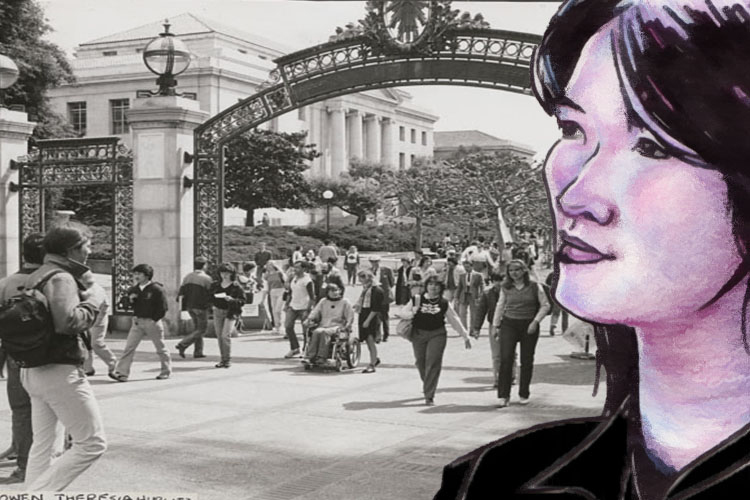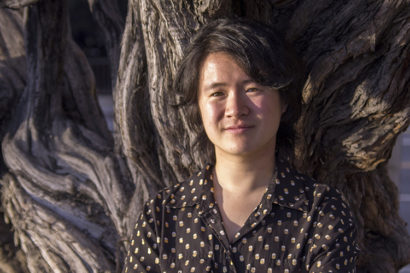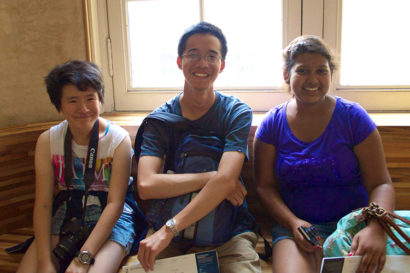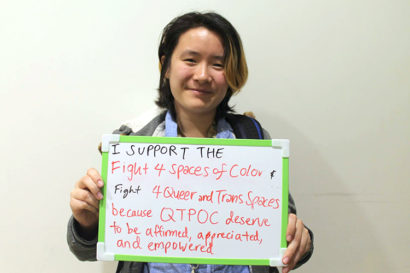I’m a Berkeleyan: Sydney Ji on the intersection of disability, culture and gender
Sydney Ji, a former student and current staffer at UC Berkeley, shares about their evolution of self-acceptance and emergence as an activist as a disabled, queer, nonbinary Asian American
October 27, 2020

Sydney Ji, a former student and current staffer at UC Berkeley, shares about their evolution of self-acceptance and emergence as an activist as a disabled, queer, nonbinary Asian American. (Photo from the Disabled Students’ Program photograph collection, UARC PIC 28H:001, The Bancroft Library, University of California, Berkeley; UC Berkeley illustration by Hulda Nelson)
“My parents are both from Shanghai, China. They came to the U.S. as international students to get master’s degrees in engineering and, later, they made their way to the Bay Area because they heard there were a lot of jobs in tech companies and that there was a growing Asian diaspora community here.
I grew up in Cupertino. I think my parents chose it for the school district — there were a lot of upper middle-class and wealthy Asian immigrants and Asian Americans in my schools. It was an incredibly competitive environment, especially in middle school and high school. People would brag about how little sleep they got. It was so brutal.

Ji, who graduated from Berkeley in 2017 with a degree in psychology, is now a customer service assistant for the Berkeley International Office. (Photo by Em, courtesy of Sydney Ji)
I think it led to me putting a lot of my self-worth into what grades I got, even though, on a philosophical level, I didn’t think it was right. I still had an ideal that education should be for the sake of learning — to explore your passions and be a better member of society. But in reality, I felt like I needed to do certain things to get credentials in order to make a living and survive under capitalism.
There would be teachers who would criticize or complain about Asian students and their parents, saying, ‘They’re so obsessed with grades.’ That might be part of the reason there wasn’t support or accommodations in the schools I went to — because the administrators would have said, ‘They’re just trying to cheat their way to a better grade.’ I think my parents probably regret having sent me to that school district, because now I have all these mental illnesses and chronic illnesses that I developed from that environment.
During my first year as a student at Cal, I met other students who identified as disabled and, in some cases, shared other identities with me, like being queer and trans and Asian, which I think was helpful for me. I was part of the UNITY Theme Program, a residential community on campus that focuses on LGBTQ education, community building and leadership development. For the first time, I was surrounded by LGBTQ people, and it was just a non-issue that I was trans. I gradually began to feel more comfortable introducing myself with my pronouns they/them and just being more out in my life.

Ji (front, right) poses with members of Berkeley’s Nikkei Choral Ensemble to promote their spring 2017 showcase. (Photo by Thurston Dang)
At that point, I didn’t think I was disabled or I felt like, ‘Am I really disabled enough? I don’t really deserve to have this — it wouldn’t be fair. I just need to work harder to overcome whatever deficiency I have.’ I passed as being neurotypical, even though it wasn’t actually true. I think that’s why it took me years to get accommodations from the Disabled Students’ Program on campus.
Having accommodations was a huge help to me, not only because I was able to do things like record my classes or have extra time on tests, but also because it helped a lot for me to see that I wasn’t struggling because I was weak or lazy or incompetent.
In my third year, I took the class Intro to Disability Studies with Marsha Saxton. It was a pretty significant year for me, because it was the first time I had accommodations and was using them. The professor and the graduate student instructor, Katie Savin, were both very proactive about telling students, ‘These are your accommodations, and we’ll make sure you have them.’ It was nice to feel like it was normalized for me to have accommodations and to not feel ashamed or embarrassed about having disabilities. Katie also organized an optional field trip for us to see a show by Sins Invalid, a disability justice performance project, where I got to witness the unapologetic joy and beauty of disabled artists, who were mostly people of color.
I hope that by being more visible, I might help others to feel a little safer to express who they are and ask for what they need.
After I graduated from Cal in 2017 with a degree in psychology, I started working as a customer service assistant for the Berkeley International Office, which provides immigration-related advising and advocacy to international students and scholars on campus.
In my job, I have seen how immigration policy has changed very rapidly in the last few years, in response to the stoking of long-existing racialized fears of immigrants in the U.S. I relate to the personal experiences of the students we serve who face anti-East Asian racism and xenophobia in Berkeley, and I see similarities and differences to the experience of my parents, who came here during the years that were covered by the Chinese Student Protection Act of 1992.
When my parents got to the U.S., they say it wasn’t that they didn’t face racism; it was more that they felt they couldn’t do anything about it. The best they could do was be productive and make a lot of money to at least try to protect themselves from being too financially harmed by it. When I was younger, I was very critical of that, but now I can understand why they felt this need to push their kid.

Ji (left) sits with two other students during a trip to France organized by Monta Vista High School. It wasn’t until Ji was 18 that they were screened for depression and they realized, “Wow, that was a decade of my life that I was suicidal, and nobody ever picked up on it.” (Photo courtesy of Sydney Ji)
I wasn’t screened for depression until I was 18. At that point, I knew how to talk about my depression to a doctor so that they would flag it, and I realized, ‘Wow, that was a decade of my life that I was suicidal, and nobody ever picked up on it.’ I didn’t feel like I could advocate for myself or bring up my own concerns that weren’t physical health problems.
I have come to understand that there are differences in the way people perceive their symptoms, or the way symptoms manifest, which can be linked to a person’s racial or ethnic culture they were brought up in. For instance, someone in my family might not report, ‘I’m feeling sad,’ or ‘I don’t have a will to live.’ Instead, it might be more like, ‘I’m having chronic digestive problems,’ or ‘I’m having trouble sleeping,’ or ‘I always have headaches.’ I also know there are a host of physical conditions that my family experiences that people might not as readily see as disabilities, such as cancer, strokes and susceptibility to illnesses, that I now suspect could be a result of trauma in several generations of my family that hasn’t ever really been addressed.
As a staff person at Berkeley, I try to be intentional about what I choose to show people about myself. I always introduce myself using my pronouns and have them in my email signature and with my name during Zoom meetings, even though I dislike drawing attention to myself. I’m part of the Dismantling Racism Study and Action Group for justice, liberation and belonging at UC Berkeley and I’m part of the leadership and volunteer team for LavenderCal, a campus network for LGBTQ+ faculty and staff.

Ji holds a message of support for a campaign by the bridges Multicultural Resource Center and the Queer Alliance Resource Center to be assigned a new space that better serves their needs than the basement of Eshleman Hall. (Photo courtesy of Sydney Ji)
I’m also participating in a mentorship program with the Berkeley Staff Assembly, which provides opportunities for networking and development for staff. During one of our sessions, I said that one of my hopes for the program was to find someone who might have experience with, or be able to provide advice for, how to manage my disabilities and get accommodations when I have mostly ‘invisible’ disabilities. There’s no blueprint for us to follow on how to advocate for understanding around these issues, especially when our disabilities do impact our work.
And I decided to apply for the Chancellor’s Advisory Committee for the LGBTQ Communities at Cal after another staff member suggested it as a way that I could contribute to far-reaching policy changes across campus. On the committee, I’ll draw upon my own experience as a staff member and former student, as well as my knowledge of Bay Area resources, in my work to cultivate a campus environment that will truly be safe for queer and trans people of color.
I hope that by being more visible, I might help others to feel a little safer to express who they are and ask for what they need. I want to contribute, even in some small way, to creating the supportive environment that I wish I had when I was younger.”
Following are some resources that Ji has found useful in their life as a queer, nonbinary, disabled Asian American:
- UC Berkeley’s Department of Ethnic Studies
- Books by author Leah Lakshmi Piepzna-Samarinha, a queer disabled femme writer, organizer, performance artist and educator
- Writing by Lydia X. Z. Brown, who works in radical disability justice and disability policy
- Writing by Mia Mingus, a writer, educator and organizer for disability justice and transformative justice
- Sins Invalid, a disability justice-based performance project
- Son of Baldwin, a social justice social media community
- The Body is Not an Apology magazine
- Minor Feelings: An Asian American Reckoning by Cathy Park Hong
- Queer Women of Color Film Festival